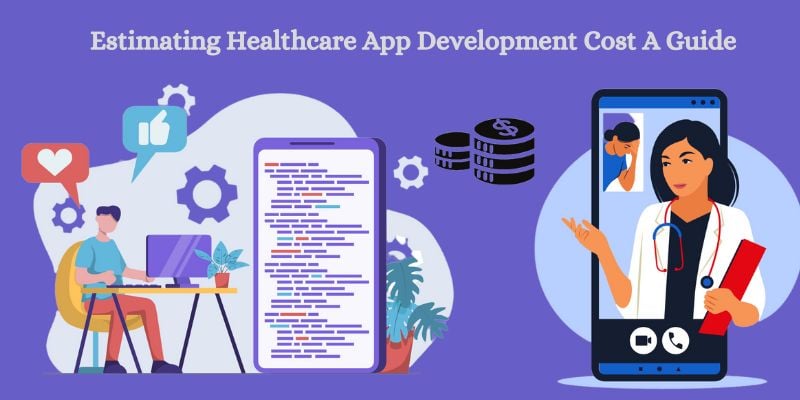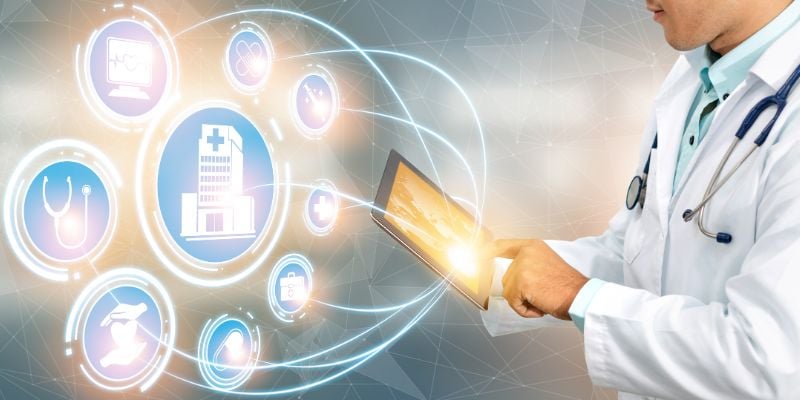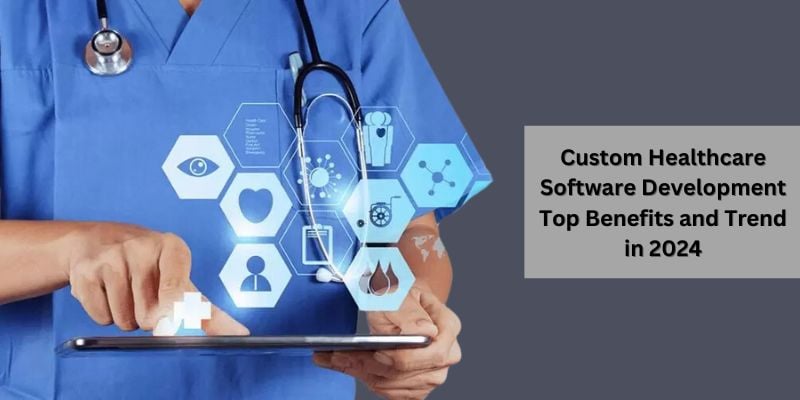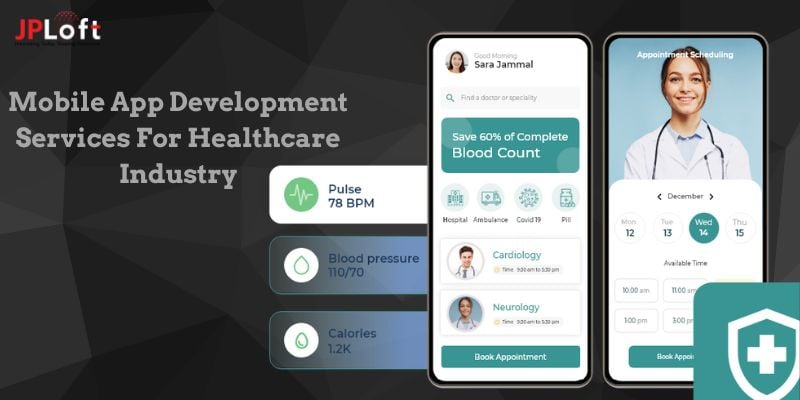The healthcare market has always been a steady sector that has never experienced a recession. With the growing number of information and security threats, manual processes at private clinics, corporate hospitals, and insurance companies are replacing mobile devices with feature-rich and user-friendly applications.
If you're a medical professional, hospital or corporation owner, or a businessperson looking to enter the billion-dollar healthcare industry, Healthcare mobile app development is the solution you require.
You can create a healthcare application that caters to the requirements of healthcare providers, patients, and configurations. You can also customize the product to suit your specific business needs. However, the billion-dollar question is, what will it cost you? The main issue you must consider is the cost of developing an app for healthcare. In this article, we'll guide you through the possibilities of the cost of developing a healthcare app and the elements that influence the cost.
Healthtech Market Overview
The worldwide mHealth market reached $119.5 billion at the end of 2023 and could reach $400 billion in 2028. The market for digital health is expanding rapidly and is expected to grow at a rate of 27.0% from 2023 until 2028. This increase is driven by the increasing use of smart devices and digital services to provide healthcare for patients worldwide.
The increasing attention to improving fitness and health among the younger generation and the increased usage of smart apps are expected to boost the market's growth further.
In addition, the demand for digital healthcare services and patient remote monitoring is growing in tandem with the need for health apps on mobile devices, which is anticipated to boost the market's growth in the coming years.
What Exactly is Healthcare App Development?
Mobile app development for healthcare involves developing an application specifically designed for the health and well-being of the users. It is categorized under "mobile healthcare applications." With a couple of taps on their smartphones, users of mobile health apps have access to a wide range of medical facilities and other information (without physically going to the location in case of minor issues).
In addition to being extremely convenient, these apps enable people suffering from health issues or seeking to improve their fitness to perform their daily activities with greater efficiency. These apps are made to aid both patients and medical professionals.
The apps are designed to serve various purposes, such as administrative work, research in medicine or patient care, and communication between healthcare professionals. They are compatible with various platforms, such as tablets, mobile phones, and computers.
Types of Healthcare Apps
There are many applications within the area of well-being and health. The users don't need the approval of a medical professional for each one. Instead, you could launch your company with a healthcare app development that caters to fitness enthusiasts and gym-goers.
Understanding what healthcare applications are available before deciding on the best way to develop a mobile healthcare application is essential. This will allow you to select the type of feature and category that best suits your requirements.
The majority of healthcare apps fall into two categories general to the industry:
Applications for Healthcare Professionals
Health applications designed for doctors, nurses, and other medical professionals assist them in providing health care services to patients.
This is why it is vital to ensure HIPAA compliance when creating an application and pay particular attention to encrypting private data to avoid data breaches.
Below are some examples of healthcare applications specially designed and intended for doctors.
Medical Record App
Medical record applications contain an individual's medical history. This includes blood pressure readings, trips to A&E, medications, recent blood markers, etc. Medical experts can use the application to update their medical records.
Clinical and Diagnosis App
Mobile apps can simplify clinical decisions and allow patients to interact with medical professionals in hospitals. Voice and text chat files, file sharing, and electronic health record (EHR) systems are only some of the options.
Doctors are more inclined to use clinical and diagnosis software to manage large amounts of data. These software programs can alert patients of upcoming appointments and help them keep track of their medical histories and appointments.
Medical Database Applications
There are dedicated apps that allow doctors to save all their patients' medical data in one place. A full-service healthcare app development solution offers a secure application that integrates the symptoms of a patient's prescriptions, medications, or symptoms.
Doctors can profit from the reference apps by staying up-to-date on the patient's health and making treatment more efficient by keeping up with the most current advancements in medical technology.
Medical Billing App
Doctors, medical accountants, hospital administrators, clinics, etc., could utilize medical billing software based on these programs to simplify invoice and billing processes.
It can be useful for keeping patient data records, such as processing payments, managing claims, and registering patients. Most often, these applications are managed by the accounting departments in hospitals and clinics. Additionally, doctors can utilize this program to handle their billing through medical representatives and surgical shops, for example.
Telehealth
The growth of healthcare app development has allowed patients to communicate with professionals in the mental health field on the Internet and receive counseling from the comfort of their homes. This is due to the latest telehealth technology.
The mobile application's mechanisms for patient engagement allow patients to talk with their doctor about nutrition, medical issues, lifestyle, and much more. During the COVID-19 early wave, millions of people across the globe received help and stayed safe without leaving their homes due to telehealth apps.
Application For Patients
They are healthcare mobile applications used by patients and the general population who wish to lead healthy lives. The applications are designed to increase satisfaction, loyalty, general well-being, and improved health outcomes.
Fitness Apps
Numerous fitness apps have been successful and can be used to lead a healthy and active life. It includes BetterMe, MyFitnessPal, and Digifit, just to name a few of the well-known fitness and health apps that offer solutions.
These apps are great for people who are new to staying healthy. Most health app development markets are populated with self-guided and guided fitness apps.
The latter allows users to collaborate with a virtual instructor to track their diet, health, and exercise routines, helping them develop healthy habits.
Appointment scheduling app
Doctors and patients can use the same software to set up appointments, monitor patients remotely, and interact with patients.
For instance, patients can utilize a medical application to schedule an appointment and then alter the date. Any change made is immediately communicated to the medical team via email.
Personal health record
You may also create a separate health app for your personal recording. The application is beneficial for those suffering from chronic illnesses such as type 2 diabetes, cancer, cardiovascular disease, etc. It will allow people to keep their health in check in all circumstances.
These apps for healthcare can update the patient's health status in real-time. This means that the doctor can alter the patient's medication and avoid further complications.
Lifestyle App
This is an example of a patient-oriented application that is beneficial in maintaining the healthiest diet and following the right routine. This kind of application will take care of your fitness, nutrition, and exercise requirements. Additionally, it teaches users to follow an appropriate diet and adhere to an eating plan that will lead to an active lifestyle.
Users are also informed about the workouts they should perform to stay healthy. The app also does all the testing to help them tailor their exercises.
Diet and Nutrition App
Specific applications focus on eating and nutrition, such as Fooducate, Lifesum, and others. These apps encourage users to keep a healthy diet while monitoring their eating habits.
The plan for developing your healthcare app must include reminders, meal plans, calorie calculators, health and food databases, and many useful features. These features will be valuable to users and keep them returning for more.
Must-Have Features of Healthcare Applications
In this section, we'll examine the advanced and complicated health app features that can assist you in creating an app for healthcare and a compatibility layer to create your mobile app for healthcare development into a full product designed for the health industry using the best monetization method. Certain functions employ Artificial Intelligence to enhance user experience, which could become your brand's main selling point.
Social Integration
The registration process must be as easy as possible. Therefore, allowing social sign-in via well-established social network accounts is essential. The primary pages for signing in are Facebook and LinkedIn. EHR applications, however, may require more information about the user to secure their accounts based on the type of mHealth application you design.
Video Conferencing
The people who use your mobile healthcare application may or might not feel it is convenient to visit the doctor. Therefore, you could consider enhancing the chat service to include videoconferencing. Users could use this service to get a one-on-one consultation with their doctor or medical professionals. Videoconferencing allows patients to visit a doctor's clinic without leaving their homes, so the patient receives the same level of care in the hospital.
Ratings and Reviews
If a health organization insures medical professionals, patients must be able to locate ratings about the doctor, read user feedback about them, and get feedback on them. This feature could be beneficial in the health app development process. Furthermore, it will assist healthcare institutions in establishing trusting relations with their customers.
Analytics & Reports
It is possible to upgrade your medical app's design to provide daily updates regarding complaints from medical app users and their behavior. Therefore, you should consider the integration of medical apps with analytics. Develop a strategy first to determine the data type you want to analyze and the methods to study it. Check if analytical procedures impact the confidential data. This requires a minimum of one hour to develop an app for medical purposes. If possible, utilize the most current analytics technique, including artificial intelligence, to improve diagnosis.
Symptoms Checker
Online calculators for symptom checkers require users to enter information, such as their gender and age, as well as their location on their signs and symptoms of illness. The self-diagnosis features of a health app will offer a wide range of health conditions based on computer-generated algorithms that can be tailored to the specific issues a person may be experiencing. The entire process will help the user feel more relaxed; therefore, they are essential for a modern health screening application.
Multilingual and Cloud Management
To improve the usage of mobile healthcare solutions, users must be able to utilize the mHealth software naturally or in their preferred language. This feature of mobile apps for healthcare will provide patients with an understanding of the services. Additionally, the data could be processed easily via cloud storage, which can be used to create a multilingual interface, making the app's access to data even easier.
Clinical Specialty Templates
Doctors must provide reports to patients so they can provide medical services. Additionally, they often treat patients with similar problems and must repeat the same actions repeatedly. This helps doctors develop models that can be replicated by an efficient electronic health record (electronic medical records) system to treat patients with similar issues.
Factors Affecting the Cost of Healthcare App Development
Healthcare application development is determined by various elements that determine the total cost together. These aspects will help developers, project managers, and others make informed choices and develop precise estimates. Let's explore the intricacies of these factors that are crucial:
App Complexity and Features
The complex nature of the app is one of the major factors determining its cost. Applications that are simple in their functionality, such as appointment scheduling, are likely to be less expensive than those with complicated features, such as live health monitoring in real-time and telemedicine, as well as integration with wearables and AI-powered health diagnostics. The more complex and distinctive the features, the greater work is needed to develop them, which results in higher costs.
Design and User Experience (UX)
Designing a simple and visually pleasing user interface increases user involvement. A properly designed UX requires careful design, wireframing, prototyping, and rigorous testing. The design phase could contribute substantially to the cost if the app needs complex visual elements, animations, or personalized user experiences.
Platforms and Devices
Development for various platforms (iOS, Android, web) adds time to custom healthcare mobile app development and expenses. In addition, accommodating different resolutions and sizes, including tablets, smartphones, and wearables, requires additional effort for speed and compatibility.
Integration with Third-Party Systems
Healthcare applications must often be integrated into electronic health records (EHR) systems, hospital databases, payment gateways, and other external services. Integrations with these systems can be complicated and require careful planning, testing, and compliance with data security standards, which could add to the total price.
Data Security and Compliance
Healthcare applications handle sensitive patient information, requiring strict compliance with HIPAA regulations (Health Insurance Portability and Accountability Act).
Implementing HIPAA-compliant video conferencing solutions such as IoT is crucial to ensuring the secure transfer of confidential health information in virtual consultations and contributing to overall regulatory compliance.
Securing data encryption, user consent mechanisms, and audit trails add a layer of difficulty and costs to the development process.
Regulatory Approval
Based on the app's purpose and the location it will be utilized, getting the necessary regulatory authorizations (e.g., FDA approval for medical devices) can be lengthy and expensive. Compliance with these regulations is vital but could lead to lengthy time-to-market and higher costs.
Testing and Quality Assurance
Due to the importance of apps that aid in healthcare, rigorous testing and quality control are essential. Thorough testing of various applications, scenarios, and user behaviors will ensure a seamless user experience and adherence to medical guidelines. This process requires more time and resources, which adds to the total cost.
Maintenance and Updates
After launch, maintenance, and updates to the app with bug-fixing features, enhancements to the app, security updates, and compatibility changes for platforms are constant costs. It is important to consider maintenance costs over the long term when planning the total development costs.
The expertise of the healthcare app development company and Location Expertise and the location of your team of developers can affect the price. Employing experts in the field of development, UI/UX designers, and domain experts could have higher costs. In addition, the geographical position of the team can affect the cost of labor because rates differ among nations.
Project Management and Communication
A well-organized project management system, regular communication, and team collaboration are essential in ensuring the project succeeds. Effective tools for managing projects, regular meetings, and efficient communication channels can add expenses if they are not properly managed.
Cost of App Development for Healthcare For Different Product Types
When exploring the world of developing healthcare apps, one can't help but think about the expenses involved, particularly when creating solutions for hospitals and healthcare providers. Patients.
Healthcare App Development Cost for Hospitals and Doctors
Have you ever considered why applications for hospitals or doctors may come with a more expensive cost? The reason is their complexity and the necessity of seamless integration.
The initial cost is generally between $150,000 and $200,000 for healthcare applications tailored to doctors and hospitals. The higher cost is because these applications need to work seamlessly with EHR/EMR systems and other software that clinics and hospitals typically employ. The aim here isn't only to launch a new software but to ensure that it's an integral component in the current healthcare system, improving efficiency and providing better patient healthcare without affecting existing processes.
Cost to Develop a Healthcare App for Patients
On the other hand, as we focus on health apps specifically for patients' needs, the cost of healthcare application development structure is altered. They generally fall in the price range of $100 up to $150,000. Why is this? The main reason is the degree of integration required with current medical systems. In contrast to other health app applications for health care, apps for patients typically require minimal or no interaction with EHR systems.
But consider the expense of creating an insurance-related app for a few minutes. Because of the required integrations, the cost is likely similar to those of hospitals and providers.
Furthermore, there's a strong focus on user-friendly applications for patients. Because most people are familiar with mobile applications in their everyday lives, they expect an ease of use similar to medical applications. This approach, similar to a consumer app, not only makes healthcare more accessible but also lowers the cost of development (lots of pre-made software is available in this area).
Indeed, creating a user-friendly application that matches the features and style of popular consumer apps may be much simpler than developing systems that need to be integrated into the complex Internet of healthcare IT infrastructure. As you know, this can increase the development costs for healthcare websites.
Average Cost of Developing a Healthcare App
The cost of developing mobile applications for healthcare can vary significantly based on a range of variables. However, you can anticipate spending between $40,000 and $100,000 for a basic or middle-complexity health app. The expense of developing an extremely complex and large-scale mobile application for healthcare is believed to be between $300,000 and $100,000. The amount can be higher or lower.
The app's complexity and variety of functions, the vendor's location, the operating system, the platform, and many other elements all contribute to the wide array of costs associated with developing healthcare apps.
To obtain an accurate estimate of the costs involved in creating a healthcare application, you must contact a reputable mobile app development firm. They'll understand your requirements and offer a custom estimate that fits your needs.
How to Manage the cost of developing Healthcare Apps under control
Businesses are always looking for ways to reduce their expenses, including the cost of developing a mobile healthcare app. What options are available at your disposal?
Cross-Platform Development Tools
Frameworks such as React Native and Flutter can reduce your budget by as much as x1.5 by using a common code base that is compatible with iOS and Android. Additionally, the code generated by an app on both platforms can be reused to develop web-based applications.
Off-the-Shelf SDKs and Code Libraries
We've been repeating this message: don't design typical elements by hand. Find a widely available solution and modify it to suit your needs.
White-Label and No-Code Solution
When it comes to ready-made components, purchasing and branding a white-label product is a viable option. Integrating this white-label product into your digital ecosystem is easy, e.g., sync it using a practice management system. Clinics can kick-start a telehealth program using our components that do not require code based on a small budget.
Rapid Prototyping
Prototyping is an essential part of the custom health apps we create. It can help confirm a business idea (test user experience and UI concepts) in the design phase without coding and is much less costly than programming.
Outsourcing
Outsourcing is a feasible method, but it's crucial to be cautious. Combining the intricate aspects of medical app development with possible cultural miscommunications could create an app that isn't up to expectations. It's crucial to be aware that the price of healthcare app development in the USA discussed here represents this particular market's particular requirements and standards.
The Key Takeaway
The costs involved in developing healthcare software are vital since they may differ based on several aspects, including the program's complexity, the technology platform used, the developers' team, and the timeline. For accurate estimates of the costs, it's important to know the requirements of your project. You should select a reliable and experienced business to help you develop software. They will help you navigate the procedure and give you an estimate of the costs for the project.
The number of healthcare apps is growing, and it can be a fantastic option to make accessibility more accessible and provide better patient results. Innovative and innovative Health apps that target people in need result from extensive thought, investigation, research, and analysis at the beginning of development. Collaborating with a healthcare mobile app development company is essential to develop the most cutting-edge health applications. JPLoft is a top mobile app development company that assists businesses in reaching the highest quality by providing top-quality services. Contact our experts to receive an estimate of the development cost for healthcare applications today.
Frequently Asked Questions
1. What are the factors to consider when estimating the expenses of building a health application?
The expense of creating an app that is designed for healthcare includes considering factors such as the complexity of the features, the complexity of UX/UI design, and the expertise of the team that is responsible for the development process along with the mobile platform's capabilities for engagement models as well as compliance and regulations IoT integration, as well as other elements.
2. How does selecting a technology stack affect the performance and security of a health application?
A technology stack comprising frameworks, databases, programming languages, and the like is essential for efficiency, scalability, and security. A well-designed stack can provide optimal functionality, efficient security, and data management methods that align with the healthcare industry's standards.
3. What is the reason for the regulation-compliant development of healthcare applications, and how does it impact the price?
Compliance with HIPAA or GDPR rules is vital to protect patient data and privacy. Implementing compliance functions adds complexity to the process, which can impact the cost and time of developing apps for healthcare.
4. What factors should be considered when choosing the best health app development company?
Selecting the best healthcare app development company requires looking at factors like the company's expertise in the field of healthcare, its understanding of regulations, experience in the creation of solutions for different types of customers (mid-small or large and enterprise) as well as their ability to develop MVPs as well as fully-fledged solutions, and dedication to ongoing support and collaboration.








